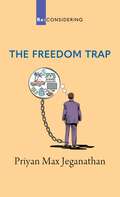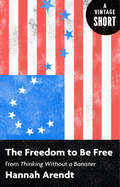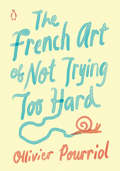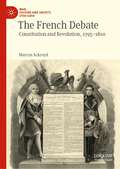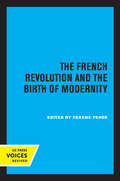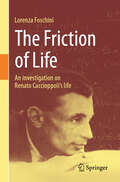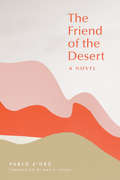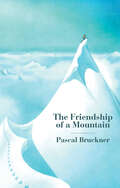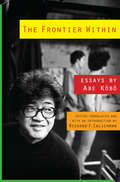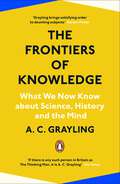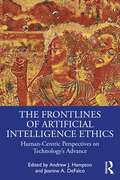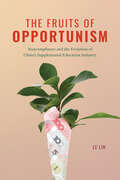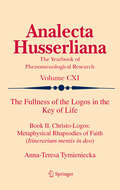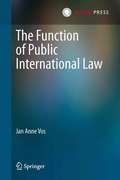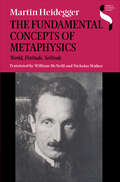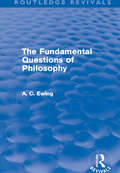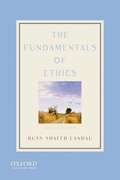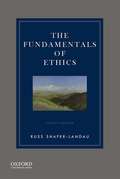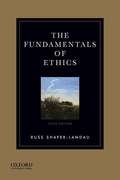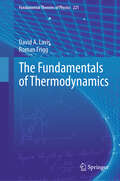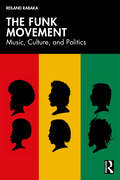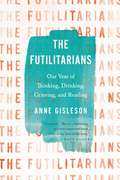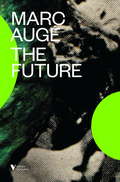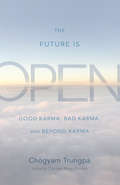- Table View
- List View
The Freedom Trap (Re: CONSIDERING)
by Priyan Max JeganathanRe:CONSIDERING invites you to look at what’s familiar from an unfamiliar angle. To consider how we consider things – and how to do it better.Has our obsession with freedom distracted us from more important things?Freedom has crept out of our constitutions and legal systems and into our eating, shopping and live-streaming habits.There’s more and more to be free from: inconvenience, offence, limits – anything that stands in the way of what we want. And yet, we are – somehow – more anxious, grumpy and divided than ever.Can a society that’s drunk on freedom come back to its senses? What if freedom is a trap? And if it is, what can we do to free ourselves from it?
The Freedom to Be Free: From Thinking Without a Banister (A Vintage Short)
by Hannah ArendtThis lecture is a brilliant encapsulation of Arendt’s widely influential arguments on revolution, and why the American Revolution—unlike all those preceding it—was uniquely able to install political freedom. “The Freedom to be Free” was first published in Thinking Without a Banister, a varied collection of Arendt’s essays, lectures, reviews, interviews, speeches, and editorials—which, taken together, manifest the relentless activity of her mind and character and contain within them the articulations of wide and sophisticated range of her political thought. A Vintage Shorts Selection. An ebook short.
The French Art of Not Trying Too Hard
by Ollivier PourriolSick of striving? Giving up on grit? Had enough of hustle culture? Daunted by the 10,000-hour rule? Relax: As the French know, it's the best way to be better at everything.In the realm of love, what could be less seductive than someone who's trying to seduce you? Seduction is the art of succeeding without trying, and that's a lesson the French have mastered. We can see it in their laissez-faire parenting, chic style, haute cuisine, and enviable home cooking: They barely seem to be trying, yet the results are world-famous--thanks to a certain je ne sais quoi that is the key to a more creative, fulfilling, and productive life. For fans of both Mark Manson's The Subtle Art of Not Giving a F*ck and Alain de Botton's How Proust Can Change Your Life, philosopher Ollivier Pourriol's The French Art of Not Trying Too Hard draws on the examples of such French legends as Descartes, Stendhal, Rodin, Cyrano de Bergerac, and Françoise Sagan to show how to be efficient à la française, and how to effortlessly reap the rewards.A PENGUIN LIFE TITLE
The French Debate: Constitution and Revolution, 1795–1800 (War, Culture and Society, 1750 –1850)
by Marcus AckroydThis book explores the creation and career of the French Constitution of 1795, operative from the start of the Directory until Napoleon’s takeover in 1799. It explores the composition, history and replacement of the French Revolution’s third Constitution through a focus on the speeches and writings of four sets of political voices discernible in late 1790s France. The four main chapters present these voices as Thermidorians, Conservatives, Republicans and Brumairiens. They reveal the intensity and breadth of the debates generated by the permanent tension between the Constitution and the many ongoing conflicts of the Revolution. Set within and beyond the government and the two legislative chambers, the debates feature numerous conflicts central to the French Revolution including the composition and functions of the public powers, the legitimacy of exceptional laws, the regulation of the press and freedom of religion. This sustained focus on the relationship between the political nation and the Constitution provides a fresh reading of the political culture of the Directory.
The French Revolution and the Birth of Modernity
by Ferenc FehérWritten from widely different perspectives, these essays characterize the Great Revolution as the dawn of the modern age, the grand narrative of modernity. The scope of issues under scrutiny is extremely broad, ranging from the analyses of the hotly debated class character of 1789 and the problem of the nation state to the "Cult of the Supreme Being," the emancipation of the Jews, and the cultural heritage of the Revolution. This title is part of UC Press's Voices Revived program, which commemorates University of California Press’s mission to seek out and cultivate the brightest minds and give them voice, reach, and impact. Drawing on a backlist dating to 1893, Voices Revived makes high-quality, peer-reviewed scholarship accessible once again using print-on-demand technology. This title was originally published in 1990.
The Friction of Life: An investigation on Renato Caccioppoli's life
by Lorenza FoschiniNaples, May 8, 1959. Renato Caccioppoli, a mathematical genius, prodigious pianist, captivating storyteller, highly cultured and multilingual, believed to be the grandson of the anarchist movement founder Mikhail Bakunin, takes his own life by shooting himself in the back of the head in his residence at Palazzo Cellammare.Adored by students and colleagues, a symbol of freedom and non-conformity for an entire generation, Caccioppoli enchanted not only some of the most celebrated intellectuals of the century – André Gide, Pablo Neruda, Eduardo De Filippo, Benedetto Croce, Alberto Moravia, Elsa Morante – but also, and above all, the people of Naples, who have always regarded him with amazed admiration. Persecuted by the fascist regime, afflicted by what the writer and friend Paola Masino would describe as "the friction of life," his death permanently places him in the city's history.This meticulous and well-documented investigation tells us who Caccioppoli truly was and offers us an un-stereotyped and, in some ways, unprecedented portrayal of a legendary Naples.
The Friend of the Desert: A Novel
by Pablo D'OrsExistential and curiously hypnotic, Pablo d'Ors evokes the sharp stylized prose of Bolaño, Bernhard, and DeLillo in this strange tale of one man's repeated forays into the desert, and the ultimate silence it contains."Thanks to the back cover of a book I knew that there lived in Brno a man who had dedicated a good portion of his life to traveling through many of the world's deserts." So begins Pavel's story, as a series of mysterious circumstances lead him to change the course of his life. On his repeated trips to the Sahara, first as part of an enigmatic organization called Friends of the Desert and later on his own, Pavel explores the drifting sands, and, ultimately, something approaching infinity. Nothing is as it seems. As the unknowns increase, each encounter presents a new mirror for Pavel's own expanding consciousness. Innumerable artists, thinkers, and mystics have paid their respects to the void. With refinement and care, Friend of the Desert inserts itself to that tradition. In the wake of Hesse's famous Siddhartha, Bolaño's By Night in Chile, and Don DeLillo's The Names, Pablo d'Ors approaches the depths and casually settles in. Friend of the Desert is a rare gift for seekers of the absolute.
The Friendship of a Mountain: A Brief Treatise on Elevation
by Pascal BrucknerWhy are we fascinated by mountains? These outcrops of rock were once considered unsightly, something to be avoided at all costs, but, since Rousseau, they have been contrasted with our corrupt cities and viewed as serene enclaves of beauty and relaxation. But why climb to the summit only to come back down again? Why does the toil of climbing convert into joy? What metaphysics of the absolute is playing out here – what challenge does climbing pose to time and ageing, to fearful panic, to the brush with danger which leads to conquest? It’s not faith that elevates mountains – it’s mountains that elevate our faith in challenging us to overcome them. These hooded majesties crush some people while exalting others. For the latter, climbing means being born again, reaching a state of exhilaration. Being seized by exhaustion upon arriving at the summit is akin to casting your eyes upon paradise. Is it the stinging cold, the wind so strong that it almost knocks you down, or is it higher powers that speak to us in this mixture of terror and beauty? A child of the mountains who spent his youth in Austria and Switzerland, Pascal Bruckner has special ties to the subject of this book: the further he climbs, the more he reconnects to his past. In sparkling and sensual prose, Bruckner’s paean to the majesty of mountains weaves together things seen and things read, childhood memories, literature and philosophy, interlaced with reflections on life, ageing and the unrivalled beauty of an ecosystem that we are in danger of destroying.
The Frontier Within: Essays by Abe Kobo (Weatherhead Books on Asia)
by Kōbō AbeAbe Kobo (1924–1993) was one of Japan's greatest postwar writers, widely recognized for his imaginative science fiction and plays of the absurd. However, he also wrote theoretical criticism for which he is lesser known, merging literary, historical, and philosophical perspectives into keen reflections on the nature of creativity, the evolution of the human species, and an impressive range of other subjects. Abe Kobo tackled contemporary social issues and literary theory with the depth and facility of a visionary thinker. Featuring twelve essays from his prolific career—including "Poetry and Poets (Consciousness and the Unconscious)," written in 1944, and "The Frontier Within, Part II," written in 1969—this anthology introduces English-speaking readers to Abe Kobo as critic and intellectual for the first time. Demonstrating the importance of his theoretical work to a broader understanding of his fiction—and a richer portrait of Japan's postwar imagination—Richard F. Calichman provides an incisive introduction to Abe Kobo's achievements and situates his essays historically and intellectually.
The Frontiers of Knowledge: What We Know About Science, History and The Mind
by A. C. Grayling'Grayling brings satisfying order to daunting subjects' Steven Pinker_________________________In very recent times humanity has learnt a vast amount about the universe, the past, and itself. But through our remarkable successes in acquiring knowledge we have learned how much we have yet to learn: the science we have, for example, addresses just 5 per cent of the universe; pre-history is still being revealed, with thousands of historical sites yet to be explored; and the new neurosciences of mind and brain are just beginning. What do we know, and how do we know it? What do we now know that we don't know? And what have we learnt about the obstacles to knowing more? In a time of deepening battles over what knowledge and truth mean, these questions matter more than ever. Bestselling polymath and philosopher A. C. Grayling seeks to answer them in three crucial areas at the frontiers of knowledge: science, history and psychology. A remarkable history of science, life on earth, and the human mind itself, this is a compelling and fascinating tour de force, written with verve, clarity and remarkable breadth of knowledge._________________________'Remarkable, readable and authoritative. How he has mastered so much, so thoroughly, is nothing short of amazing' Lawrence M. Krauss, author of A Universe from Nothing'This book hums with the excitement of the great human project of discovery' Adam Zeman, author of Aphantasia
The Frontlines of Artificial Intelligence Ethics: Human-Centric Perspectives on Technology's Advance
by Andrew J. HamptonThis foundational text examines the intersection of AI, psychology, and ethics, laying the groundwork for the importance of ethical considerations in the design and implementation of technologically supported education, decision support, and leadership training. AI already affects our lives profoundly, in ways both mundane and sensational, obvious and opaque. Much academic and industrial effort has considered the implications of this AI revolution from technical and economic perspectives, but the more personal, humanistic impact of these changes has often been relegated to anecdotal evidence in service to a broader frame of reference. Offering a unique perspective on the emerging social relationships between people and AI agents and systems, Hampton and DeFalco present cutting-edge research from leading academics, professionals, and policy standards advocates on the psychological impact of the AI revolution. Structured into three parts, the book explores the history of data science, technology in education, and combatting machine learning bias, as well as future directions for the emerging field, bringing the research into the active consideration of those in positions of authority. Exploring how AI can support expert, creative, and ethical decision making in both people and virtual human agents, this is essential reading for students, researchers, and professionals in AI, psychology, ethics, engineering education, and leadership, particularly military leadership.
The Fruits of Opportunism: Noncompliance and the Evolution of China's Supplemental Education Industry
by Le LinAn in-depth examination of the regulatory, entrepreneurial, and organizational factors contributing to the expansion and transformation of China’s supplemental education industry.Like many parents in the United States, parents in China, increasingly concerned with their children’s academic performance, are turning to for-profit tutoring businesses to help their children get ahead in school. China’s supplemental education industry is now the world’s largest and most vibrant for-profit education market, and we can see its influence on the US higher education system: more than 70% of Chinese students studying in American universities have taken test preparation classes for overseas standardized tests. The Fruits of Opportunism offers a much-needed thorough investigation into this industry. This book examines how opportunistic organizations thrived in an ambiguous policy environment and how they catalyzed organizational and institutional changes in this industry.A former insider in China’s Education Industry, sociologist Le Lin shows how and why this industry evolved to become a for-profit one dominated by private, formal, nationally operating, and globally financed corporations, despite restrictions the Chinese state placed on the industry. Looking closely at the opportunistic organizations that were founded by marginal entrepreneurs and quickly came to dominate the market, Lin finds that as their non-compliant practices spread across the industry, these opportunistic organizations pushed privatization and marketization from below. The case of China’s Education Industry laid out in The Fruits of Opportunism illustrates that while opportunism leaves destruction in its wake, it can also drive the formation and evolution of a market.
The Fullness of the Logos in the Key of Life
by Anna-Teresa TymienieckaThis highly personal account of a lifetime's spiritual and philosophical enquiry charts the author's journey of faith through contemporary culture. Distinguishing between what she posits as the 'universal' and the 'rhapsodic' logos, Tymieniecka interrogates concepts as varied as creativity and the media, joy and suffering, and truth and ambiguity. She contemplates the possibilities and limits of communication between human beings, and outlines what she calls the 'transnatural destiny' of the human soul. The book asserts that unlike theory, which unfolds a logical continuity, and unlike dialogue, which is directed sequentially upward toward intellectual conclusions, the mode of reflection of the 'rhapsodic logos' imposes no limits or caps upon its understanding. Instead, the 'logoic' flow interlaces the rhapsodic cadences of our reflections on reality, in all their innumerable fluctuations, and sifts them to mold the intimate mind/soul inwardness that we experience as faith. The radiative meditations of this 'rhapsodic logos' weave their way through the entanglements of the mystery of incarnation, the constitutive archetypes, the inwardly sacred, the transnatural destiny of the soul, and finally ascend the rhapsodic scales toward culminating faith in the Christo-Logos.
The Function of Public International Law
by Jan Anne VosThis book addresses fundamental aspects of the concept of public international law in both theory and practice. The argument developed by the author is that, underlying the traditional, horizontal, structure of public international law, a vertical structure of the concept of law may be discerned. This vertical structure is seen unfolding into two, mutually exclusive, frameworks: a framework of obligation, accounting for obligations, and a framework of authorization, accounting for rights. The problem then arising is that a concept of public international law which only admits either rights or obligations cannot be regarded as coherent. The author, however, takes and substantiates the position that coherence can be achieved by suppressing the mutual exclusivity of both frameworks. This move paves the way to formulating the function of public international law in terms of the constituting of international society. Since in public international law the theoretical aspects profoundly affect practice, this book is not only of interest to academics, but also for practitioners, such as officials of foreign offices and international institutions.
The Function of Public International Law
by Jan Anne VosThis book addresses fundamental aspects of the concept of public international law in both theory and practice. The argument developed by the author is that, underlying the traditional, horizontal, structure of public international law, a vertical structure of the concept of law may be discerned. This vertical structure is seen unfolding into two, mutually exclusive, frameworks: a framework of obligation, accounting for obligations, and a framework of authorization, accounting for rights. The problem then arising is that a concept of public international law which only admits either rights or obligations cannot be regarded as coherent. The author, however, takes and substantiates the position that coherence can be achieved by suppressing the mutual exclusivity of both frameworks. This move paves the way to formulating the function of public international law in terms of the constituting of international society. Since in public international law the theoretical aspects profoundly affect practice, this book is not only of interest to academics, but also for practitioners, such as officials of foreign offices and international institutions.
The Fundamental Concepts of Metaphysics: World, Finitude, Solitude (Studies in Continental Thought)
by Martin Heidegger" . . an important addition to the translations of Heidegger's lecture-courses . . Heidegger's voice can be heard with few of the jolting Germanicisms with which so many translations of Heidegger's texts have been burdened. . . ." —International Philosophical Quarterly"The translators of these lectures have succeeded splendidly in giving readers an intimation of the tensely insistent tone of the original German. Heidegger's concern with a linguistic preconsciousness and with our entrancement before the enigma of existence remains intensely contemporary." —Choice"There is much that is new and valuable in this book, and McNeill and Walker's faithful translation makes it very accessible." —Review of Metaphysics"Whoever thought that Heidegger . . . has no surprises left in him had better read this volume. If its rhetoric is 'hard and heavy' its thought is even harder and essentially more daring than Heideggerians ever imagined Heidegger could be." —David Farrell KrellFirst published in German in 1938 as volume 29/30 of Heidegger's collected works, The Fundamental Concepts of Metaphysics includes an extended treatment of the history of metaphysics and an elaboration of a philosophy of life and nature. Heidegger's concepts of organism, animal behavior, and environment are uniquely developed and defined with intensity.This work, the text of Martin Heidegger's lecture course of 1929/30, is crucial for an understanding of Heidegger's transition from the major work of his early years, Being and Time, to his later preoccupations with language, truth, and history. First published in German in 1983 as volume 29/30 of Heidegger's collected works, The Fundamental Concepts of Metaphysics includes an extended treatment of the history of metaphysics and an elaboration of a philosophy of life and nature. Heidegger's concepts of organism, animal behavior, and environment are uniquely developed and defined with intensity.
The Fundamental Questions of Philosophy (Routledge Revivals)
by Alfred C EwingFirst Published in 1951, this outline work on the theory of knowledge and metaphysics is intended both for university students who have recently started on the subject and for any who, without having the advantage of studying it at university, wish by private reading to acquire a general idea of its nature. The book deals with all the main questions arising within the field in so far as they can be stated and discussed profitably and simply. The topics discussed include the place of reason in knowledge and life, the possibility of knowledge beyond sense-experience, the theory of perception, the relation of body and mind, alleged philosophical implications of recent scientific doctrines, the problem of evil and the existence of God.
The Fundamentals of Ethics (2nd Edition)
by Russ Shafer-LandauIn The Fundamentals of Ethics, Second Edition, author Russ Shafer-Landau employs a uniquely engaging writing style to introduce students to the essential ideas of moral philosophy. Offering more comprehensive coverage of the good life, normative ethics, and metaethics than any other text of its kind, this book also addresses issues that are often omitted from other texts, such as the doctrine of doing and allowing, the doctrine of double effect, ethical particularism, the desire-satisfaction theory of well-being, and moral error theory. Shafer-Landau carefully reconstructs and analyzes dozens of arguments in depth, at a level that is understandable to students with no prior philosophical background. NEW TO THE SECOND EDITION: * Discussion questions at the end of every chapter provide students with immediate ways to test their understanding of the material * New, real-life extended examples reinforce the importance of the theories discussed in Chapters 4, 7, 9, 10, 14, 15, and 19 * Greatly expanded coverage of moral rights (in Chapter 8) and of membership in the moral community (in Chapter 9) * A new discussion of skepticism about morality in the Introduction * An Instructor's Manual and Testbank on CD and a Companion Websiteatwww. oup. com/us/shafer-landau Ideal for courses in introductory ethics and contemporary moral problems, this book can be used as a stand-alone text or with the author's companion reader,The Ethical Life: Fundamental Readings in Ethics and Moral Problems,Second Edition, which offers original readings on ethical theory and contemporary moral problems.
The Fundamentals of Ethics (Fourth Edition)
by Russ Shafer-LandauIn The Fundamentals of Ethics, Fourth Edition, author Russ Shafer-Landau employs a uniquely engaging writing style to introduce students to the essential ideas of moral philosophy. Offering more comprehensive coverage of the good life, normative ethics, and metaethics than any other text of its kind, this book also addresses issues that are often omitted from other texts, such as the doctrine of doing and allowing, the doctrine of double effect, ethical particularism, the desire-satisfaction theory of well-being, moral error theory, and Ross's theory of prima facie duties. Shafer-Landau carefully reconstructs and analyzes dozens of arguments in depth, at a level that is understandable to students with no prior philosophical background. Ideal for courses in introductory ethics and contemporary moral problems, this book can be used as a stand-alone text or with the author's companion reader, The Ethical Life: Fundamental Readings in Ethics and Moral Problems, Fourth Edition.
The Fundamentals of Ethics (Third Edition)
by Russ Shafer-LandauThis engaging book introduces students to the essential ideas of moral philosophy. Offering more comprehensive coverage of the good life, normative ethics, and metaethics, this book also addresses issues that are often omitted from other texts such as the doctrine of doing and allowing, the doctrine of double effect, ethical particularism, the desire-satisfaction theory of well-being, and moral error theory.
The Fundamentals of Thermodynamics (Fundamental Theories of Physics #221)
by Roman Frigg David A. LavisThe aim of this text is to provide an account of the fundamentals of thermodynamics which is accessible at graduate level to physicists, mathematicians and philosophers of physics. The bulk of the book (Chapters 2-9) is based on the algebraic approach of Lieb and Yngvason, but extended to encompass both positive and negative temperatures and systems in which entropy increases and decreases in adiabatic processes. We show that these four possibilities are already present in Carathéodory's version of the Second Law which arises as a theorem from the axioms. We develop generalized versions of the Kelvin-Planck and Clausius formulations valid for the same range of systems. The parallel development in Chapter 10 takes a geometric approach. We discuss the limitations associated with the local nature of Carathéodory's Principle and present the resolution of this problem due to Boyling. Part of the aim here is to substantiate the claim of Arnold that the mathematical structure of thermodynamics is contact geometry. The last two chapters of the book extend the scope of the discussion to, respectively, critical phenomena and non-equilibrium systems. Chapter 11 is a presentation of phase transitions and critical phenomena in which we discuss universality and use scaling theory to derive scaling laws. Chapter 12 contains a generalization to non-equilibrium. We present the extension of Lieb and Yngvason's work to non-equilibrium and also give a brief account of classical irreversible thermodynamics (CIT). The latter enables a possible understanding of the way that the lack of a unique entropy function in the Lieb and Yngvason non-equilibrium approach can be resolved. The book is completed by a set of appendices which provide mathematical and physical support to the work in the main text.
The Funk Movement: Music, Culture, and Politics
by Reiland RabakaRabaka explores funk as a distinct multiform of music, aesthetics, politics, social vision, and cultural rebellion that has been remixed and continues to influence contemporary Black popular music and Black popular culture, especially rap music and the Hip Hop Movement.The Funk Movement was a sub-movement within the larger Black Power Movement and its artistic arm, the Black Arts Movement. Moreover, the Funk Movement was also a sub-movement within the Black Women’s Liberation Movement between the late 1960s and late 1970s, where women’s funk, especially Chaka Khan and Betty Davis’s funk, was understood to be a form of “Black musical feminism” that was as integral to the movement as the Black political feminism of Angela Davis or the Combahee River Collective and the Black literary feminism of Toni Morrison or Alice Walker. This book also demonstrates that more than any other post-war Black popular music genre, the funk music of the 1960s and 1970s laid the foundation for the mercurial rise of rap music and the Hip Hop Movement in the 1980s and 1990s.This book is primarily aimed at scholars and students working in popular music studies, popular culture studies, American studies, African American studies, cultural studies, ethnic studies, critical race studies, women’s studies, gender studies, and sexuality studies.
The Futilitarians: Our Year of Thinking, Drinking, Grieving, and Reading
by Anne GislesonRecommended Summer Reading -- Louise Erdrich, New York TimesA memoir of friendship and literature chronicling a search for meaning and comfort in great books, and a beautiful path out of griefAnne Gisleson had lost her twin sisters, had been forced to flee her home during Hurricane Katrina, and had witnessed cancer take her beloved father. Before she met her husband, Brad, he had suffered his own trauma, losing his partner and the mother of his son to cancer in her young thirties. "How do we keep moving forward," Anne asks, "amid all this loss and threat?" The answer: "We do it together." Anne and Brad, in the midst of forging their happiness, found that their friends had been suffering their own losses and crises as well: loved ones gone, rocky marriages, tricky childrearing, jobs lost or gained, financial insecurities or unexpected windfalls. Together these resilient New Orleanians formed what they called the Existential Crisis Reading Group, jokingly dubbed "The Futilitarians." From Epicurus to Tolstoy, from Cheever to Amis to Lispector, each month they read and talked about identity, parenting, love, mortality, and life in post-Katrina New Orleans, gatherings that increasingly fortified Anne and helped her blaze a trail out of her well-worn grief. Written with wisdom, soul, and a playful sense of humor, The Futilitarians is a guide to living curiously and fully, and a testament to the way that even from the toughest soil of sorrow, beauty and wonder can bloom.
The Future
by John Howe Marc AugeFor Marc Augé, best-selling author of Non-Places, the prevailing idea of "the Future" rests on our present fears of the contemporary world. It is to the future that we look for redemption and progress; but it is also where we project our personal and apocalyptic anxieties. By questioning notions of certainty, truth, and totality, Augé finds ways to separate the future from our eternal, terrified present and liberates the mind to allow it to conceptualize our possible futures afresh.From the Trade Paperback edition.
The Future Is Open: Good Karma, Bad Karma, and Beyond Karma
by Carolyn Rose Gimian Chogyam TrungpaRenowned meditation master Chögyam Trungpa challenges popular misconceptions of the Buddhist doctrines of karma and rebirth, in the process showing how to step beyond karma on the path to awakening.Karma has become a popular term in the West, often connected with somewhat naive or deterministic ideas of rebirth and reincarnation or equated with views of morality and guilt. Chögyam Trungpa unpacks this intriguing but misunderstood topic. He viewed an understanding of karma as good news, showing us that liberation is possible and that the future is never predetermined. His unique approach to presenting the Buddhist teachings lends itself to an insightful and profound view of karma, its cause and effects, and how to cut the root of karma itself.
